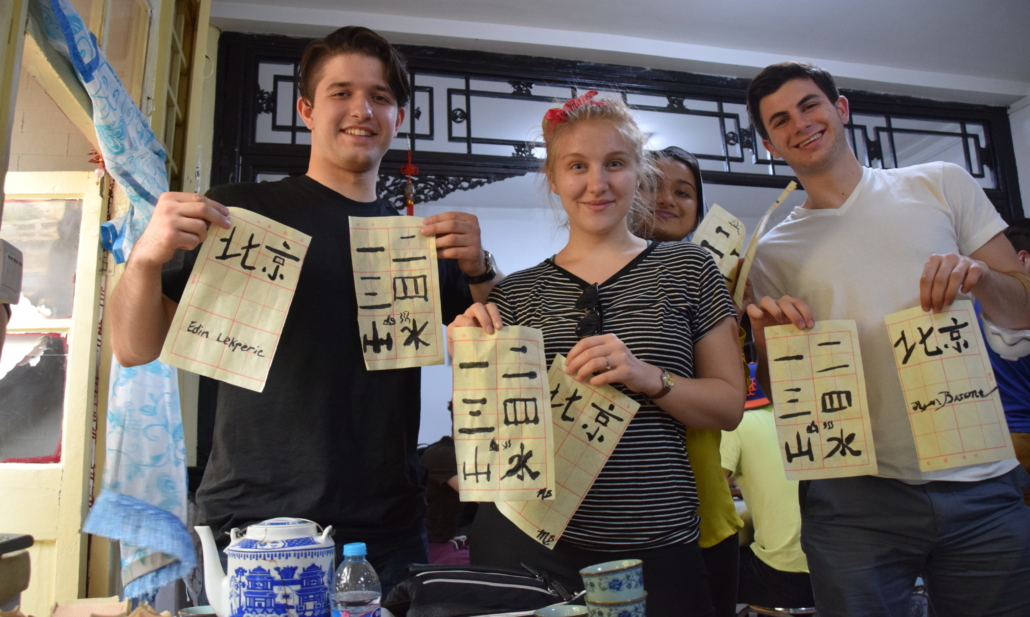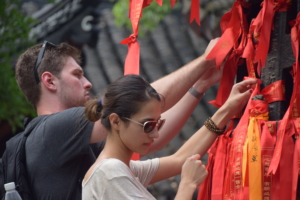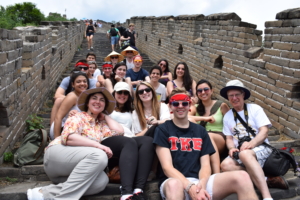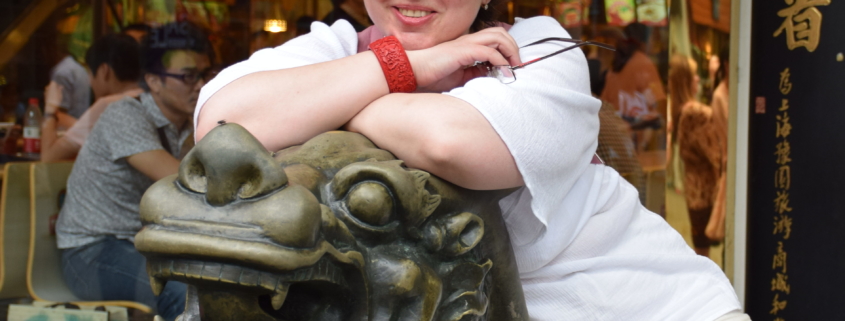Anna Shostya
 My Confucius Institute Story
My Confucius Institute Story
By Anna Shostya
I woke up in tears. The Phoenix Hotel felt empty, and as I walked to the cleaners and the French bakery that morning, I felt that KongJiang Lu, the street that I felt to be so close to my heart, had lost some charm, too. The workers at the KFC across the hotel hailed me as I came for lunch and somehow that made me cry, too. I just bid goodbye to my 19 students at the airport. They have not yet boarded the plane that will take them back to the United States, and yet, I already miss them. I am fighting the tears running down my cheeks. I climbed the Great Wall of China, so I am a Man (不到长城非好汉, as Mao Zedong said), and men do not cry.
It was Shanghai that stole my heart and became my second home.
I have been to China many times before, as a visiting professor at the University of Shanghai for Science and Technology. In fact, I came every year, sometimes even twice a year, to teach Chinese students Principles of Economics, Money and Banking, Advertising, and other economics and business subjects. I taught in English, but every time I came to China, I learned a few Chinese words here and there and over time, I developed what I called “a survival kit” – a set of important words and phrases that helped me survive on the streets of Shanghai. And although I traveled to many distant lands and explored many unique places in the Middle Kingdom, it was Shanghai that stole my heart and became my second home. I could get lost on the streets of the old town and just enjoy the secret treasures it offered – street food, local music, or random conversations. Or I could wake up at six o’clock in the morning and join the old ladies practicing Qi Gong in Heping Park. Or I could try my Chinese language skills at the local market. Shanghai would never disappoint. China would never bore. In fact, China always had this amazing therapeutic, invigorating effect on me.
 This time it was different.
This time it was different.
It was the first time that my colleague Professor Joseph Morreale from Pace University and I brought a group of our American students to China. We wanted to get the students interested in our new five-course China Economic Studies Program and introduce them to the wonderful opportunities of the Confucius Institute (CI) at Pace University. We had them take a brief set of seminars on Chinese language and culture through the CI and also exposed them to some of the faculty of the Institute.
When we were designing the short-term faculty-led study abroad course, we were thinking about two major goals. One was purely educational. China is a superpower, but it is also a country of great complexity. Its fast economic growth pulled millions of people out of poverty, yet inequality is rather widespread. Its rising middle class enjoys driving luxury cars, yet the heavily-polluted air damages the health of children and adults alike. We wanted our American students to understand these contradictions and we wanted them to get a first-hand experience with the country that has been at the center-stage of the world’s attention for several decades. A two-week study-abroad course would provide a great opportunity for our students to have such an experience. It would expand their knowledge of China’s culture, history, and economic development.
China is a superpower, but it is also a country of great complexity.
But there was another, more subtle objective of our course. We wanted to share with them our love for China, and especially, for Shanghai. With China, there is no middle ground – you either love it or you hate it. Prof. Morreale and I loved it from the first sight. We wanted to infect our students with that love, too. So, we took them to the places we enjoyed the most – KonJiang Lu, Shen Garden restaurant, the Aquarium, the Oriental TV Tower, People’s Square, and the Bund. We wanted to share with them our fascination with the 5,000 years of history, the delectable cuisine, and especially the people. And we were so happy to see that we had succeeded in achieving both goals!
And now the students are gone. The tears are still burning my eyes. It was the most exhausting and at the same time the most rewarding experience I have ever had!
 We beefed up their itinerary to a degree that was difficult to imagine. And yet, no one complained. They were literally immersed in whatever China could offer, and this total immersion was shocking, but not entirely surprising. Because I, too, went through this “immersion” experience when I came to China for the first time. Our students asked us economics-related questions and initiated some serious discussions. They wanted to discuss the economic and social aspects of China during lunch, on a train, and during a walk. They were eager to practice Tai Chi early in a park, to do research on a train to Beijing, and to read articles in China Daily on a bus. We, as teachers, truly appreciated their never-ending curiosity, their unceasing hunger for knowledge and new experiences, and their extraordinary open-mindedness. It made our efforts really worthwhile.
We beefed up their itinerary to a degree that was difficult to imagine. And yet, no one complained. They were literally immersed in whatever China could offer, and this total immersion was shocking, but not entirely surprising. Because I, too, went through this “immersion” experience when I came to China for the first time. Our students asked us economics-related questions and initiated some serious discussions. They wanted to discuss the economic and social aspects of China during lunch, on a train, and during a walk. They were eager to practice Tai Chi early in a park, to do research on a train to Beijing, and to read articles in China Daily on a bus. We, as teachers, truly appreciated their never-ending curiosity, their unceasing hunger for knowledge and new experiences, and their extraordinary open-mindedness. It made our efforts really worthwhile.
It was a great feeling to stand on the Great Wall…I touched the ancient stones put together by the hands of people who are long gone.
Those two weeks became a truly transformational experience for our students. Some of them took more Chinese language classes after they came back to the United States. Some started to pursue China’s Economic Studies track. Some did research on China. Some read more books about China’s culture and history. The 19 students who embarked on a great journey to gain insight into why and how the US and China can better understand one another and how we, as Americans, can personally better relate to the Chinese, have graduated some 5 years ago. Some of them went back to China. I can picture Kevin walking on the streets of Shanghai, together with his Chinese girlfriend. And I can envision Paige talking to her business partners in one of the skyscrapers in Pudong. And I often get e-mails from Ingrid, who is now teaching economics at a high school in Guangzhou. I do not know where most of them are now and what they do. But I do know for sure that China will stay in their hearts forever and that they will never think of the Middle Kingdom as just another country. And this is exactly what I wanted to do – to share with my students my great appreciation of China, and most importantly, of its people.
The last tear has dried up. I looked at the grey sky above my head – the silver speck of the plane cut through the cloud. My students are on their way home. They will never know that this was a very special trip for me. After going through six months of chemo treatments and surviving cancer last year, I was not sure if I would be able to come to China again. It was a great feeling to stand on the Great Wall, with my hair caressed by the gentle breeze from the mountains. I touched the ancient stones put together by the hands of people who are long gone. There were people before me. There will be people after me. I am part of a continuous flow. I am a Man. I climbed the Great Wall of China!

